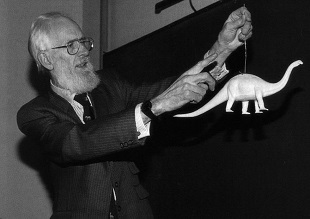 © ZOOLOGICAL SOCIETY OF LONDONZoologist Robert McNeill Alexander, an emeritus professor at the University of Leeds famous for his seminal contributions to the field of animal locomotion (and his tendency to imitate animals during his lectures), died earlier this year (March 16). He was 81.
© ZOOLOGICAL SOCIETY OF LONDONZoologist Robert McNeill Alexander, an emeritus professor at the University of Leeds famous for his seminal contributions to the field of animal locomotion (and his tendency to imitate animals during his lectures), died earlier this year (March 16). He was 81.
“His secret was that he always treated his work with playful enthusiasm—and his fun with great seriousness,” University of Leeds colleague John Lydon wrote on the university’s website. “His was a well-lived life.”
Born on July 7, 1934, in Lisburn, Northern Ireland, Alexander attended school at Tonbridge in Kent, England. He read natural sciences at the University of Cambridge, and later stayed on to complete a PhD on the function of swim bladders in fish. From 1958 to 1969, he held a post as lecturer at Bangor University (which was then University College of North Wales), studying the mechanics of swim bladders and fish jaws, among other things.
Moving to Leeds, Alexander turned his attention to animal locomotion more broadly, publishing a landmark paper in ...














